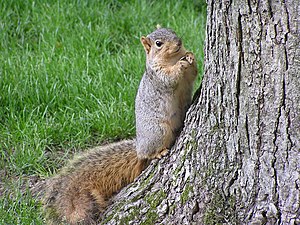Fox squirrel
| Fox squirrel | ||||||||||||
|---|---|---|---|---|---|---|---|---|---|---|---|---|

Fox squirrel ( Sciurus niger ) |
||||||||||||
| Systematics | ||||||||||||
|
||||||||||||
| Scientific name | ||||||||||||
| Sciurus niger | ||||||||||||
| Linnaeus , 1758 |
The fox squirrel ( Sciurus niger ) is a mammal from the order of the rodents (Rodentia). It belongs to the squirrel family (Sciuridae).
features
The fox squirrel is the largest tree squirrel in North America. Its total length varies between 45 and 70 centimeters, of which the tail accounts for between 20 and 33 centimeters. It weighs between 500 and 1000 grams. The fur is colored light brown-yellowish to dark brown-black, depending on the subspecies. The belly side is often lighter, some animals have white markings on their face and tail.
Habitat and Distribution
The fox squirrel is found in the eastern half of North America, from southern Canada to northern Mexico .
Way of life
Fox squirrels are lively and diurnal. They have self-made nests or inhabit tree hollows, in which they can occasionally be found together, especially as pairs during the mating season. The diet of the fox squirrel consists of tree seeds, nuts, berries, fruits, bark, buds, insects, bird eggs and small reptiles. They bury part of their supplies as winter reserves and contribute to the spread of these plants through forgotten plant seeds.
Twice a year, in summer and in winter, fox squirrels can have offspring. The young are born blind and naked. After about three months they become independent, after a year they reach adulthood. The maximum life expectancy is 12.6 years for females and 8.6 years for males.
The enemies of the fox squirrel include humans ( hunting ), hawks , snakes and lynxes .
Systematics
The fox squirrel is classified as an independent species within the genus of squirrels ( Sciurus ), which today consists of a total of 28 species. The first scientific description comes from Carl von Linné , who described the species in 1758 in the 10th edition of his Systema naturae as one of the first species of squirrel and assigned it to the genus Sciurus, which he first described, as one of six rodent genera . In addition to the fox squirrel S. niger and S. cinereus and the Eurasian squirrel, this also contained the European flying squirrel ( S. volans , today Pteromys volans ), the atlas squirrel ( S. getulus , today Atlantoxerus getulus ), the striped chipmunk ( S. striatus , today Tamias striatus ) as well as the species Sciurus flavus, which cannot be assigned . The individuals he describes were likely from southern South Carolina .
- Sciurus niger avicennia A. H. Howell , 1919
- Sciurus niger bachmani Lowery & Davis , 1942
- Sciurus niger cinereus Linnaeus , 1758
- Sciurus niger limitis Baird , 1855
- Sciurus niger ludovicianus Custis , 1806
- Sciurus niger niger Linnaeus , 1758
- Sciurus niger rufiventer É. Geoffroy Saint-Hilaire , 1803
- Sciurus niger shermani Moore , 1956
- Sciurus niger subauratus Bachman , 1839
- Sciurus niger vulpinus Gmelin , 1788
Others
The fox squirrel was added to the “List of Unwanted Species” for the European Union in 2016.
supporting documents
- ^ Carl von Linné : Systema naturae. 10th edition, 1758; Volume 1, pp. 60, 63-64 ( digitized version ).
- ^ John L. Koprowski: Tamias quadrivittatus. ( Memento of the original from March 15, 2016 in the Internet Archive ) Info: The archive link was inserted automatically and has not yet been checked. Please check the original and archive link according to the instructions and then remove this notice. Mammalian Species 479, 1994.
- ↑ List of Invasive Alien Species of Union Concern (PDF) accessed on July 15, 2016
literature
- Richard W. Thorington Jr. , John L. Koprowski, Michael A. Steele: Squirrels of the World. Johns Hopkins University Press, Baltimore MD 2012, ISBN 978-1-4214-0469-1 , pp. 60-64 .
- John L. Koprowski: Tamias quadrivittatus. Mammalian Species 479, 1994.
Web links
- Sciurus niger in the endangered Red List species the IUCN 2006. Posted by: Kirkland, 2000. Retrieved on December 11 of 2006.
- Species description of the American Society of Mammalogists (PDF file; 1.08 MB)
